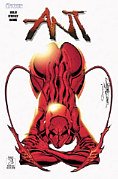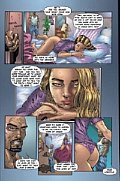So here we are. The finale. The final one. The end. Excited?
I bet you are.
And what a mixed bag it is. Two sides to this, my ill-metaphored sword.
 On one side, it's a shinning beacon to all that is JLU; it has action, it has heroes, it has battles. It has great animation, some really smart one liners and it treats all it's characters with dignity. On the other side, it is all slightly ill paced, utilizes the worst case of deux ex machina I've seen on TV and lacks a little character detail for my personal taste.
On one side, it's a shinning beacon to all that is JLU; it has action, it has heroes, it has battles. It has great animation, some really smart one liners and it treats all it's characters with dignity. On the other side, it is all slightly ill paced, utilizes the worst case of deux ex machina I've seen on TV and lacks a little character detail for my personal taste.In a little more depth (or in the context of the plot, maybe a little less), "Destroyer" concludes the season arc "Legion Of Doom". Lex Luthor's Legion returns to Earth after accidentally unleashing the maniac god Darkseid instead of the maniac machine, Brainiac. The Justice League and the Legion Of Doom (or Secret Society as DC would prefer) come together in alliance to stop this threat as revenge thirsty Darkseid and his creatures invade Earth.
There isn't much more than this to the story, but then the whole episode is designed to be a virtual homage to all that is super-hero action. One shouldn't condemn this episode for the weak plot, it's all about action, action, action.
Action certainly comes thick and fast. It's fluid, dynamic and very exciting stuff. Some pretty nasty scenes there; a spear in Shayera's wing, a decapitation of one of Darkseid's many goons.. It's all fun, occasionally shocking and unlike some of the previous episodes, the action scenes feel well placed and not contrived. After-all, action is the whole point to the story.
While it means there is little in terns of story-depth, this approach allows the show to pay it's respects to as many characters equally and fairly. This seems rather appropriate for a show about a whole league of super-heroes.
In between the action, there is some nice dialogue and a couple of welcome character scenes. J'onn makes a return. The character has clearly evolved and as he intended, found a life. Good on him.
Those expecting any serious resolutions won't find any. This is JLU-alongside-the- Legion-of-Doom-versus-Darkseid-and-minions (his generic minions, don't expect any of his usual cohorts).
The focus battle is Batman, Luthor and Superman Vs Darkseid. The arena: The remains of "The Daily Planet" building. It's a damn fine fight. A particular highlight for me was Superman's small speech before he goes "extra super" on Darkseid.
The attempts from Batman and Luthor to distract Darkseid's attack on Superman give this feud an extra layer. Some may argue having a mortal like Batman knock a virtual god over is slightly unrealistic. However, considering how vital Batman has been to Justice League, it's nice to see him have some serious interaction. It's particularly good to see Superman and Batman working together again.
This seems a good time to take a break from the good, and speak of the bad. Overall, there isn't much of this, but there were certainly some issues in this episode.
I still question (for those who read my review of the previous episode, "Alive") as to whether Darkseid needed to return. He offers nothing new here at all. It's Darkseid after Superman again and the fight is like an extended version of their last encounter in "Twilight". It's good, but with all of DC's literature at their disposal, did we need a forth reckoning? Wasn't "Twilight" major finale strong enough?
Furthermore, his invasion forces are toned down to stupid drones and until his final attack on Superman, he doesn't seem that much more impressive than before. After so many world threats, this doesn't really FEEL much above the norm for JLU, despite seeing such a large roster here.
Personally, I feel that characters that are godly in nature tend to be restrictive. A story can only offer a certain amount of resolutions for such one sided battles. It seems, by "Destroyer", that DCAU have exhausted all angles on Darkseid. It's good fun, but nothing new is done with the character.
The deux ex machina in the final moments comes from the power of anti-life. The problems are two-fold. Its introduction, application and resolution are lightning fast. This really gives some pacing issues with the rest of the episode. It also means it falls for the danger of any such device; the audience feels slightly cheated after such a gigantic buildup.
The second problem is there is no explanation to this device or its effect. If this was a continuing series, you could forgive that, however as a finale in which it's used to resolve the whole story dilemma, it bewilders.
If you know your DC, there probably is no problem - you probably have the background knowledge required to understand the use of anti-life. However, a television show should cater for it's whole audience in the same way a school essay should work on the presumption the reader has little to no knowledge of the subject. In the end, the whole event feels very messy, unwanted and unresolved.
That said, we can now go back to the good. The ending is very touching. Some well executed comments (Superman's remark to Batman about getting old neatly points towards the next stage of the saga - Batman Beyond) and a wonderful montage of all that is JLU, visually and aurally. It's a lovely "heroes heading off into the sunset" type of finish. While some fans would rather have more resolution details, I feel we know all we need to. We know Batman, Superman and JLU carry on into the future. We know that Lantern and Shayera will have a child who joins the JLU. We know there are many more battles out there to fight in the interim between now and Batman Beyond.
So enjoy. It is overall, a great half hour. As I said, in some ways the ending is a little frustrating and one wonders whether having Clark simply beat Darkseid would have been a better ending to the big fight - even if it would have been a little more simplistic. I personally felt that Superman's final blows to Darkseid were an effective enough climax not to warrant any external intervention.
What's more to say? Oh yeah, Grodd and Tala don't come back. Nor do the captive half of the Legion from "Alive". There may have been no obvious deaths for the JLU team, but there were certainly serious casualties in this final epical battle.
A good end to an overall strong season. Not as strong as "Divided We Fall" and a little bit disappointing in relation to the seasons arc (Luthor does disappear mighty fast), but still a solid ending to a solid season. Regardless of the minor issues, JLU certainly was an epic series with an epic finale. Now, go and watch Epilogue again. I think this is the right time to do so.





